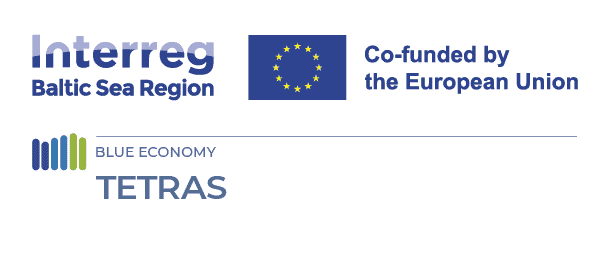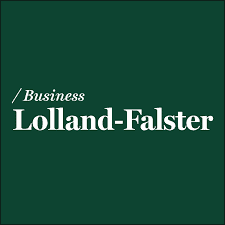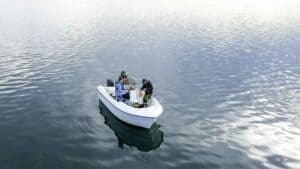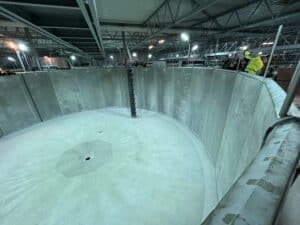
Meet our Partners: Business Lolland-Falster
20 June 2024
Ten partners from five different countries collaborate in the TETRAS project with the common goal of improving the economic and environmental sustainability of Recirculating Aquaculture Systems (RAS) in the Baltic Sea Region. TETRAS mission? To develop tools and standards to assess and monitor RAS and promote investment, implementation, and expansion of these production systems.
Today, let’s delve into the insights of Business Lolland-Falster.
Company/Organisation: Business Lolland-Falster
Country: Denmark
Interviewee(s): Annette Løttrup-Moore
Website: http://businesslf.dk/
Overview of Lolland-Falster
The twin islands of Lolland and Falster, located in the southeastern part of the Danish Archipelago in the western Baltic Sea region, form the municipalities of Lolland and Guldborgsund, home to around 100,000 residents. Every year, more than a million tourists visit these islands, drawn by their 600 km of pristine coastline, stunning landscapes, and a diverse array of quality agricultural produce. Lolland-Falster is a favorite destination for cycling and gastro-tourists alike.
The region is experiencing rapid development, notably with the construction of the Fehmarn connection, a submerged tunnel to Germany, which will bring German consumers closer to the Danish market. Other significant infrastructure projects include a gas pipeline linking the islands to the national grid (expected in 2024), several Power-to-X facilities, numerous biogas plants, a 329 MWp PV energy park, and a wheat refinery. Offshore wind has been a catalyst for the region’s green transition since the construction of ‘Vindeby,’ the world’s first offshore wind farm, in 1991. Currently, renewable energy production in Lolland-Falster is more than five times the local demand.

About Business Lolland-Falster
Business Lolland-Falster was established by the municipalities of Lolland and Guldborgsund. Since 2011, the organization has cooperated with these municipalities on strategic business development in Lolland-Falster. The partnership is built on a shared aspiration to create a dynamic business community that continuously attracts, develops, and creates new businesses and jobs.
As a business support and promotion organization, Business Lolland-Falster’s core tasks include supporting all businesses rooted in the region, showcasing the area and local businesses both nationally and internationally, and providing business-related training and networking activities.
The Aquaculture Sector in Lolland-Falster
The regional fishing industry in Lolland-Falster is now mostly historical, with only a few fishermen remaining, primarily in the western part of the islands. These days, fishing is mostly recreational, with the wild catch consisting mainly of cod, plaice, turbot, and seasonal trout and garfish. A few open net pens for growing trout are located in the waters north of the islands, but they make a limited contribution to the local economy. Historically, furcellaria (fork weed) has been harvested and processed in the region, and it has now regained potential for sustainable exploitation.
Business Lolland-Falster’s Involvement in Aquaculture
Since 2021, Business Lolland-Falster has been working on developing the aquaculture sector in the region through a collaboration with Skagen Salmon and Blue Research on RAS production. Despite the large production of various sustainably produced quality foodstuffs and ingredients in Lolland-Falster, aquatic produce remains underrepresented, even though it is in high demand.
Recirculating aquaculture systems (RAS) are of particular interest due to their potential integration into industrial cluster settings, which align perfectly with the green industry emerging throughout the region. A broad group of new and existing companies has already formed a working group to explore cluster potentials, recognizing the advantages of cross-sector cooperation. Including RAS in such a setting could provide mutual benefits and keep RAS produce competitively priced. Additionally, the Baltic Sea is under significant environmental pressure, making large-scale fish production on land, through RAS systems, the sustainable choice.
Ongoing Projects
Business Lolland-Falster participates in various projects across the Baltic Sea region aimed at supporting sustainable production (both agricultural and aquacultural), green transition (energy and resources), and the growth of SMEs and startups. Aquaculture-related projects include:
- NIFIMU: Recently completed, this project explored the potential of blue mussels to offset nutrient discharge from RAS production in the Baltic Sea.
- Closing Loops: Under the ‘Food & Bio Cluster Denmark’ and supported by the EU, the ‘CØ57 RAV’ project aims to close the nutrient cycle by converting discharged nutrients into blue mussel spat, which is then fed to black soldier fly larvae. These larvae are dried and used as a feed additive for salmon, reducing the need for fishmeal.
- TETRAS: An Interreg BSR project focused on further innovations in sustainable aquaculture.
Through these initiatives, Business Lolland-Falster continues to drive sustainable development and economic growth in the region, reinforcing its commitment to a green and prosperous future.

Business Lolland-Falster and Blue Research collaborating on a previous ‘Blue’ project. (Photo: Søren Knudsen, Business Lolland-Falster)
Business Lolland-Falster as part of the TETRAS project
What was your motivation to join TETRAS?
In 2021, Business Lolland-Falster was engaged in establishing a RAS facility in Lolland-Falster in collaboration with Blue Research for Skagen Salmon. The business case centered around a 5.000 ton/year production using recirculation technology, with wastewater treatment capabilities comparable to modern municipal plants. However, due to the large volume of water involved, obtaining a discharge permit was not feasible, and the project had to be halted.
By participating in TETRAS, we hope to leverage the pilot execution results to find a technical solution that enables viable RAS production in Lolland-Falster.

Study trip to Skagen Salmon with Rambøll, who is the external expert on pilot 1, Blue Research, and Business Lolland-Falster (Photo: Annette Løttrup-Moore, Business Lolland-Falster).
Can you describe Pilot 1, which involves the treatment of RAS discharge water to be used as technical water for other processes?
In Pilot 1, our focus is on the discharge water from a RAS facility after internal treatment, which would typically be released into the environment. However, due to our geographic location on the Baltic Sea and the high nutrient content of the discharge, obtaining a discharge permit is not feasible. Therefore, we are exploring methods to recycle this water.
The primary objective of Pilot 1 is to convert discharge water into technical water of drinking water quality. The pilot is divided into two parts. In the first part, we utilize membrane filtration technologies to produce technical water that can be used by other industrial customers in the region. In the second part, we investigate the reject fraction to separate and repurpose it, aiming to avoid creating waste that can only be landfilled. Ideally, we aim to find a solution where the added value from these by-products can offset the additional costs of water treatment.
Why did you choose to focus the pilot on the treatment of RAS water? Is water availability a challenge in the region?
Currently, groundwater availability is sufficient to meet demand. However, there is growing influx of new industrial customers requiring substantial water resources, which cannot solely rely on groundwater.
Future climate change and weather pattern alterations may affect groundwater, potentially leading to saltwater intrusion in coastal reservoirs and further reducing availability.
Currently, only private customers are assured access to groundwater, making alternative sources crucial for new industrial demands. Anticipated more frequent droughts may also increase agricultural water needs for irrigation purposes.
In response to the future shortage of ‘technical water’ in Lolland-Falster, Business Lolland-Falster previously collaborated with Rambøll and Lolland Forsyning (the public utility in Lolland) on the ‘Technical Water’ project. This initiative explored converting municipal wastewater into technical water. Our participation in TETRAS builds upon the groundwork laid by this project.
How have the industry and other stakeholders in the region responded to the goals of Pilot 1?
Both the industry and authorities have shown significant interest in the ‘cluster potential’ of a RAS plant. A RAS plant with a 5,000 ton/year capacity could potentially generate 2 million cubic meters of ‘technical water,’ which would be in high demand from several Power to X (PtX) plants and other industrial customers.
- Power-to-X (PtX) refers to a range of technologies that convert electrical power into other forms of energy or chemical products, such as hydrogen, synthetic fuels, or chemicals. This conversion process allows for the storage and use of renewable energy in various sectors, facilitating the integration of renewable energy sources into the energy system.
What do you consider the main challenges related to recirculating aquaculture implementation in the region?
The main challenges related to RAS implementation are primarily permitting issues. Changes are needed in the regulations concerning the recycling of water for the production of goods for human consumption, a point already raised by the industry.
Another potential solution for achieving a net-zero nutrient balance could involve offsetting discharged nutrients by low-trophic production, such as cultivating blue mussels in the receiving waters. However, there is currently no regulatory framework supporting this holistic approach to aquaculture. Additionally, marine spatial planning, at least in Denmark, remains a limiting factor.
How do you envision the RAS sector in Lolland-Falster evolving over the next 5 to 10 years?
With the advances already made in renewable energy in our region and the ongoing green transition, the cluster potential of RAS offers undeniable benefits. We anticipate that the RAS sector will begin to develop sooner rather than later.
Large-scale projects, involving investments in the range of 80-100 million euros, are relatively rare and may take more than 10 years to realize. However, there is significant potential in smaller systems that can replace or supplement livestock. The production of vannamei shrimp and African catfish could change our perception of how we produce ‘seafood’ and pave the way for the larger investments we aim to attract.
What outcomes or impacts do you hope to achieve through Pilot 1 and your involvement in the TETRAS project?
We hope that participating in TETRAS, as well as other aquaculture projects, will yield insights and technical solutions that enable sustainable, land-based aquaculture in Lolland-Falster and the wider Baltic Sea region. We are at a point where we need to radically change how we produce food to restore and conserve our environment, both on land and at sea. Local, sustainable, land-based production of ‘blue’ produce is a significant step in the right direction.
Stay tuned for more information about Business Lolland-Falster’s work as part of the TETRAS, as well as to learn more about our partners.





